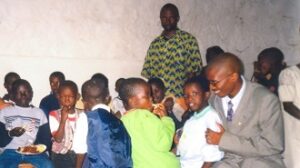
Arquivo para June 16th, 2025
Other wars and heroes
Africa lived through a long period of colonization that it would not be an exaggeration to call genocide or at least the erasure of a culture and an imperiocentric worldview, in the sense that every idea of liberation in Africa is accompanied by some form of epistemicide, which is the imposition of a worldview on the most unarmed nations that don’t share in the wealth.
exaggeration to call genocide or at least the erasure of a culture and an imperiocentric worldview, in the sense that every idea of liberation in Africa is accompanied by some form of epistemicide, which is the imposition of a worldview on the most unarmed nations that don’t share in the wealth.
I came across the book I got from a friend: “História Geral da África – África desde 1935” (General History of Africa – Africa since 1935) (2011, Cortez and UNESCO). I was careful to check the publishers, who are independent, and the translation was done by the Center for Afro-Brazilian Studies at the Federal University of São Carlos, where I studied and later taught.
Ali A. Mazrui was a Kenyan professor and political writer, who died in 2014. His assistant was Christophe Wondji, who died in 2015, a university professor from Ivory Coast.
Chapter 21 of the book, written by Ali A. Mazrui himself. Mazrui himself and colocabolaradores, I find a definition of the African soul in the form of a poem: “Nous sentons [we feel], donc nous pensons [therefore we think], donc nous sommes [therefore we are] (Mazrui, 2011, 763), the highlights are by the translators, we translate from it: we feel (perception) precedes we think (logos) which precedes we are (ontological), and with this we understand African ontology as perception and I would add hay intuition maybe fenomenology.
The book sets out an in-depth history of post-35 Africa, as well as part of colonized Africa (apartheid, for example, lasted until 1994) and there is a gap from 2015 onwards; in the previous period there would have been an analysis of the Kingdom of Congo, which had already been colonized since 1942.
I’ll make another point: “The colonialism of maintaining order was, in essence, a substitute for the colonialism of development. Belgian colonialism in Zaire (today’s DR Congo) was only marginally better than Portuguese colonialism in Angola” (Mazrui, 2011, p. 772), which we want to analyze.
Initially colonized by Portugal, the Republic of Zaire under Belgian rule (hence Belgian Congo) after revolts had its name and constitution changed to the Democratic Republic of Congo from 1971 to 1997. It is the second largest country in Africa (Algeria is the first) after Sudan was divided creating South Sudan, which is also experiencing a war and there are others in Africa.
Zaire suffered a military coup in 1965 led by Joseph-Désiré Mobutu, after a crisis known as the Congo crisis (1965), democratically elected Patrice Lumumba did not take office, becoming the Democratic Republic of Congo, but Mobutuism became known for its nepotism, corruption and messianism and was deposed in 1995 by Laurent-Desiré Kabila, politically considered ambiguous, he is an ally of the Tutsis who are enemies of the Hutus.
The regime of the Democratic Republic of Congo is semi-presidential and the current president is Félix Tshiseked, The country will be elected in 2019 and re-elected in 2023, and the prime minister is Judith Tuluka, the country has enormous mineral wealth including the famous rare earths, important for today’s technology (columbite tantalite), and among the conflicts, the northeastern province of North and South Kivu, which involve both political and ethnic issues.
Today a young man from Kivu, Floribert Bwana Chui (pictured at a school for peace), who opposed the delivery of spoiled food to the population, died under torture and refused to be corrupted and to abandon his beliefs and values, will be proclaimed “servant of God” in a ceremony at the Basilica of St. Paul Outside the Walls, with the presence of Congolese Bishop Willy Ngumbi and other cardinals of the Congo, and the presence of the Cardinal for the Causes of Saints, Marcello Semeraro.
MASRUI, Ali A., WONDJI, C. (Eds) (2011) História Geral da África: África desde 1935, v. 8, 2a. ed. Brazil, São Paulo: Cortez Editora, Brasilia: MEC/UNESCO.

